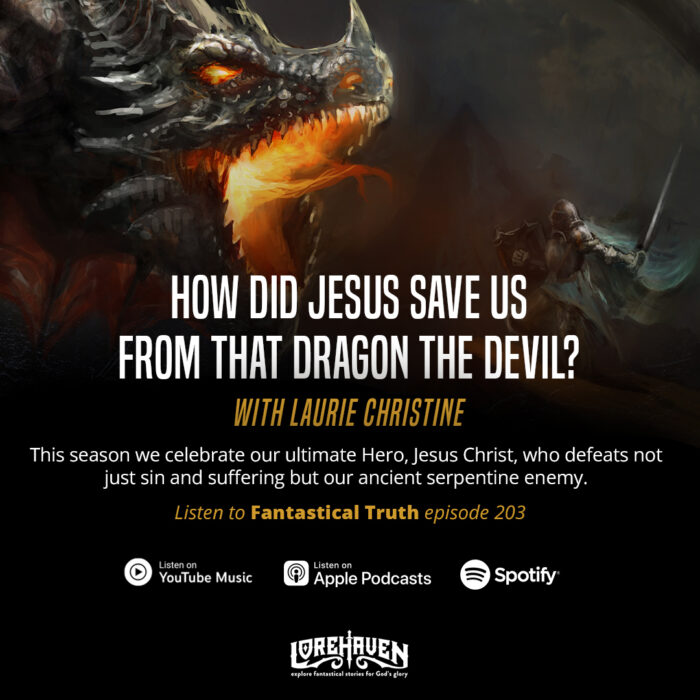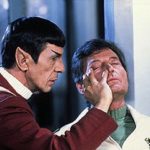Star Trekking Religion By Firefly
Is portraying religion positively enough?
Last night as my wife and I ate dinner, we watched two TV space opera episodes. Interestingly enough, both had themes dealing with religion.
Note: there are likely to be spoilers, but most of you have probably seen these before. They aren’t recent shows.
 Star Trek TNG – Who Watches the Watchers
Star Trek TNG – Who Watches the Watchers
The first show we watched from Season 3, episode 4 of Star Trek TNG, involves the plot-line where a more primitive race, encountering the Enterprise, believe Picard to be a god.
At one point, to solve the pollution of their culture, the suggestion is made that the captain give them a list of “commands” to guide the newly forming religion from devolving into holy wars and religious persecutions. An obvious reference to our own history of religious persecutions and wars.
Picard vehemently refuses to subject the people to superstitions of gods which they had given up 1000 years prior. His solution is to prove to them that he is only a mortal man like they are, except he has better “tools.”
Star Trek is known, especially when dealing with the humans, for promoting a throughly secular philosophy and world-view. The human race by that point has divested itself of religious superstitions. Only various alien races display any religion, but never based upon anything more than legend and myth. Any gods with existence are always alien beings further along the evolutionary chain than humans are just as Picard was compared to those who wanted to worship him.
Religion has no place among the humans of the Star Trek universe.
In science fiction, this perspective has flourished. One of the goals of many a Christian science fiction writer is to paint a picture where religion does still exist and plays a positive roll in that future reality.
Indeed, that aspect is one of the main reasons I felt God wanted me to write science fiction. I felt science fiction needed not only a more positive future for Christianity painted in stories, but to be an influence that the two are not incompatible with each other.
 Firefly – Jaynestown
Firefly – Jaynestown
Easily one of my favorite Firefly episodes. Out of science fiction, this show has one of the more favorable treatments of religion. While much of the crew isn’t particularly spiritual, the inclusion of Shepard Book along for the ride adds a religious dimension to the stories.
While they never label his religion, clues—like using our Bible—indicate it is some version of Christianity. Based on the later movie, Serenity, Book ends up holding a position of spiritual mentor/conscience for Mel, the ship’s captain. As far as a positive portrayal of a man of faith, Firefly scores above average.
But this episode, for all its charm and good storytelling, shows that might not be enough. While the crew is away in Canton, one subplot involves Book “babysitting” River while Simon is in town. At one point, she is busy correcting Book’s Bible, saying a lot of it doesn’t make sense. How could billions of animals fit on Noah’s boat. It had to go. Rip!
Book, not happy with her earnest efforts, attempts to help her understand. I may not quote this exactly, but he says something along the lines, “The point of the Bible isn’t to make sense, but give us something to believe in.”
Hold that thought. This subplot parallels the main story.
The crew goes into the smelly town of Canton where Jayne believes he has enemies. Unknown to him, he had inadvertently dumped his stolen money into the middle of Canton. The town, ending up with the money, made a Robin Hood-type hero out of Jayne, believing he’d done it on purpose to help them out. His folk-hero status came complete with a statue and a rousing drinking song commemorating the occasion.
As you’d expect, the enemies finally show up, and it is revealed to the people that Jayne didn’t dump the money on purpose. As the man shoots at Jayne, a boy who believes in Jayne jumps in front of him and takes the bullet, then promptly dies. The bad guy is quickly dispatched and they all leave.
As Mel and Jayne discuss it back at the ship in the closing scene of the episode, Jayne repeats River’s words though he didn’t hear them, “It just doesn’t make any sense.” In this case, why the boy would sacrifice himself to save Jayne shortly after he declared no one would do that kind of thing.
Mel’s answer, paralleling Book’s but expanding on it, is that it isn’t about making sense, but it is that the people needed a hero to believe in. Their belief isn’t based on the truth of what happened, but upon what they need to give them hope. For all its positives on including religion in a positive way, the underlying view of religion isn’t much different than in Star Trek.
So I ask again, is portraying religion positively enough?
While there is a place for more subtle seed-planting, if it portrays a false picture of Christianity, what will those seeds grow?
Christianity claims to be more than just giving hope in the midst of life’s drudgery, it is about giving life in the midst of death. The former may require inaccurate stories that are more about symbolism than truth, but the latter requires real seeds with accurate ability to grow the divine life in our souls.
No, basis in reality, no basis for life, no foundation for hope.
Or to put it in Paul’s words in 1 Corinthians 15:14,
And if Christ be not risen, then is our preaching vain, and your faith is also vain.







































*loud clapping*
I don’t know how many people have identified Firefly as a positive depiction of religion and this scene in particular with Sheppard Book. That character is at his best when he actually stands for something (the special hell scene with Mal in “Our Mrs. Reynolds” comes to mind), rather than this wishy-washy theology that made Serenity so hard to watch. Book doesn’t appear to have deep faith in God, he has deep faith in having faith. Religion here is just something to help people feel better about themselves and life, something to be tolerated, not something to truly explore and discover and accept as a fully sane, conscious human being.
I enjoy Firefly but have never understood why people think it is a good depiction of Christians. I hope our faith is grounded on something more than airy “faith” in “something,” and frankly, the idea that God doesn’t make sense and is somehow in opposition to logic has always felt pretentious and wrong.
By the way, for anyone who wants to see a truly great exploration of religion in science fiction, please watch Babylon 5, specifically the season 3 episode “Passing Through Gethsemane.”
Hear, hear. The Star Trek episode in particular is grossly offensive to anyone of any religious faith, not necessarily Christians. It was specifically intended to damn any and all religious faith and reduce it to at best a detriment to any growing society and at worst an evil to be expunged. Nothing positive comes from religion, we all know that. And when Picard crows to the female leader “I have no doubt that you will” go to the stars, the writers show their true religion — humanism through and through. Contrast this Star Dreck with Babylon 5, as you so rightly observe — religious faith is critical to some (Delenn, G’Kar) and the lack of it destroys others (Londo, Refa). The world of B5 is much more “realistic” and ultimately much more satisfying, i.e., true. Religion is a vital part of every culture. It should also be so in SF, whether specifically Christian or not!
I, unfortunately, have only seen a handful of the B5 episodes. I wish they were available on Prime streaming. I’d really like to watch the full series, especially after this comment.
I second the vote for Babylon 5.
It’s a shame when the media conglomerates don’t fulfil our needs as consumers. I’ve pretty much given up all hope of ever seeing Andromeda — the only space opera staple that I haven’t seen — because it’s not available on any streaming service under any purchase/subscription model anywhere.
Full disclosure: I was in the middle of watching through Babylon 5 a few years ago when it was taken off Netflix. I pirated the rest of the episodes.
I consider Shepherd Book a cut above some portrayals, because he’s principled without being judgmental. E.g. he disapproves of Inara’s profession without being against *her,* and in a culture where Christians are caricatured as “hateful” just for having standards, that’s something. But yes, his vague, weak theology is really unfortunate.
I’m still really sad that Book’s character didn’t get to be explored much. We never got much more than a generic picture of benevolence from him, and I think that would have been fixed if his teased backstory arc was finished and embellished upon.
I think they released a comic book specifically about Book and his backstory to try to fill in these gaps. I never read it, so can’t say how well it might have done so. In the purely cinematic world of Firefly, though, you’re quite right. The only thing that prevented his death being one of the biggest “huh?” moments of Serenity was the death I refuse to acknowledge.
Hear, hear. Shepard Book was NOT a good portrayal of a true believer. He’s clearly meant to be a Christian missionary of some kind. Therefore, his greatest desire is to see other people believe what he believes, correct? Heck, they could have made him ANY kind of missionary and the point would be the same.
So what does he tell Mal in Serenity? “I don’t care what you believe, as long as you believe in something.”
So wrong.
I also echo the comment about the much more positive portrayal of Christianity (and other religions) in Babylon 5.
I think even fellow believers might disagree with my insistence on seeing a strong Christological element in boilerplate monomythic tropes in both of those episodes. In Who Watches the Watchers especially, Picard gets wounded (metaphorical death stage of the monomyth) before returning to the aliens to leave them with an anticipation of one day transcending their current mode of existence.
*pre-emptive defensive maneuver*
(Maybe I’m an ethnocentrist, but I’m not saying that the monomyth belongs uniquely to Christianity. Only that these common story elements can be understood Christologically, and that a Christological interpretation is powerful and warranted.)
Well, your postscript has mollified me.
I can see that parallel, and it may have been in the minds of the writers too, but probably not meant in a positive way.
That is, the aliens believe Picard is a god because they think he was responsible for bringing the alien “back to life.” Consequently, one of their main request is that Picard raise their loved ones from the dead. It isn’t until Picard takes an arrow to the shoulder and bleeds that they believe he is not a god. Despite the fact he is healed (and for an unexplained reason has his arm in a sling even though previously they can knit bones back together in jiffy like they did with the alien who fell and would have multiple fractures) they realize he is not a god and can’t raise people from the dead.
Therefore, what should us Christians be thinking about our God who bled and died and returned, and refuses to raise our loved ones back to life? He’s mortal, not a god, and just had better healing tools at his disposal in a ship orbiting Earth at the time, and He can’t raise anyone to life. They had good transporters to extract His body from the burial wrappings. It can all be explained by an alien race with technology similar to the Enterprise.
It appears more that the Christological parallels are meant to discount Christianity, not reinforce it.
I’m not talking about the writers’ intentions at all. I don’t think you’re seeing what I see. The hypocrisy of the episode is that while Picard refused to give the aliens religious commandments, he leaves them with a “religious” (no NOT literally *sigh*) anticipation — they have to persevere in unbelief and secular progress so that they may one day join the enlightened community of space-faring atheists.
But in the context of this particular story and its secular presuppositions, the shedding of Picard’s blood to prove that he was not divine was the aliens’ atonement. If it resulted in the aliens being more convinced in Picard’s divinity, it couldn’t be compared to the crucifixion of Jesus at all. You have to interpret this in the context of the story and the worldview.
Ah, I get what you are saying. You’re looking at it more from the perspective of the promotion of secularism as a religion, at least as a set of beliefs. I can see that, though my interpretation is not off within the context of how I was looking at it.
Yeah, I didn’t really mean to argue with your interpretation. Sorry to be contentious; I think I caught the mood from the other thread.
Agreed. The Federation is an inherently religious organization with an inherently religious story: 1) man’s good origin, 2) man’s “fall” because of religion and prejudice, 3) man’s salvation thanks to good works, humanistic values, science, etc. 4) man’s destiny of a “paradise” as he continues to evolve and discover and accomplish good throughout the universe.
However, only in the later series Star Trek: Deep Space Nine — which showed a more-realistic portrayal of even advanced humanity in a futuristic setting — did the Star Trek begin to put this “religion” to the test by contrast with other faiths.
I would suggest this began to occur after the passing of Gene Roddenberry, who originally did not even want interpersonal conflicts among the TNG crew members.
If we’re discussing religious characters in general, not just scifi, I would like to bring up Call the Midwife, a BBC period drama about nurse/midwives in the 1950s East End. About half of the midwives are Anglican nuns, and the others live in the convent. I discuss it in some detail on my blog (Spoilers for seasons 1-2), but I’ll just mention one summarized line:
{name) didn’t have a crisis of faith, she had a wilderness experience, and believes God has given her a different path
For a secular show to put those lines in a character’s mouth is stunning.
Very true. But don’t forget Deep Space Nine, where the Bajoran religion played a crucial part in the plot. The writers couldn’t use Christianity or any other real-world religion because the secularism of humans was already established in the universe, so I think the Bajoran race became a stand-in for the spiritual side of humanity.
Arguably, several points in the show’s story arc confirm the legitimacy of at least some of the beliefs of the Bajoran religion, even if the show always leaves the “unexplained science” explanation open. And Siscko because a religious figure in more ways than one — not just unintentionally as a monomythic hero. He even quotes II Timothy 4:7 at one point, proudly and explicitly standing in the tradition of American preachers. (This is not just a theme, it’s part of the story in one episode. He’s literally standing in the tradition of African-American Christian preachers. And he embraces that tradition.)
The Bajoran religion is not a human religion. Sisko, while he eventually accepts and embraces the role of a Bajoran religious leader, never adopts the belief that the Prophets were gods, only more powerful alien entities: the standard Star Trek secular concept of any being perceived to be a god by an alien race. That said, it is the closest to presenting a religion positively in the ST universe.
Other main religions presented and tolerated are Klingons, Ferangi, though I don’t think the Ferangi one was developed much until DS9, if at all.
Oh, there was also Chekote (sp?) on Voyager who had an animalistic, Earth Native American religion. That’s the one lone exception to human religions it would seem. Interestingly enough, it is presented as real, making real contact with his animal guide on several occasions through the 7 seasons, even helping others to find theirs. It is never explained away as aliens or myth.
So I amend my statement. There is apparently one human religion presented as real in the ST universe. Though I’m sure if Gene Roddenberry had been alive when they were putting Voyager together, I doubt that part would have made the final cut.
Strange how real superstitions end up being presented as reality all the while decrying how humans have outgrown the superstitions of religion, namely Christianity. Apparently the only religion that can make that cut is one without a god above all that demands more than guiding us in our needs. Still very human/secular centered.